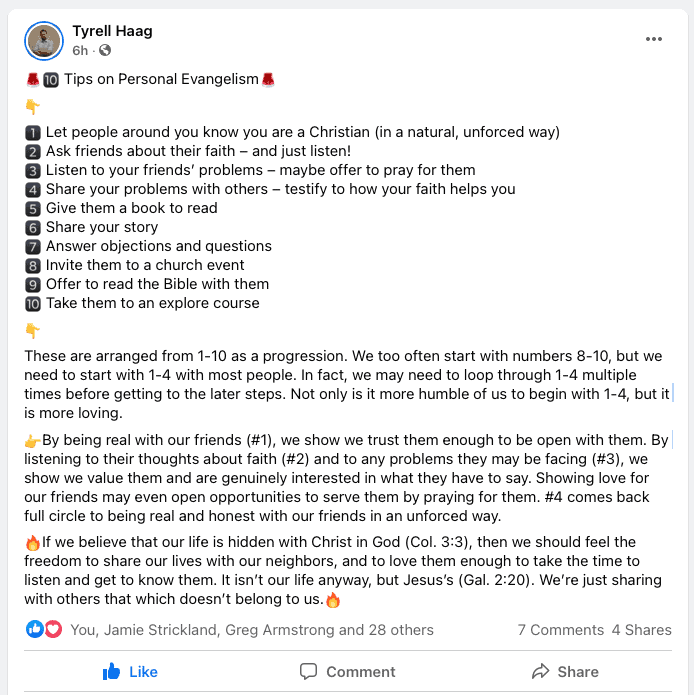Everyday Evangelism (Mark 10:17-22)

Big Idea: When talking with someone about spiritual issues, use questions and conversation to try to get to the issues of that person’s heart.
We’re getting near the end of our series on evangelism. We’ve been looking at why it’s important to share the good news about Jesus: because Jesus told us to in what we call the Great Commission. And then we’ve been looking at how to show and tell the gospel.
Today, though, I want to look at one of the most neglected topics to do with evangelism. I don’t think I’ve ever heard a sermon about it. The subject is asking questions.
Evangelism involves a few things.
- It involves making it a priority in our lives. That’s what we talked about the first week.
- It involves living lives that are distinct and reflect Jesus. That’s what we talked about the second week.
- It involves being able to explain the gospel. That’s what we looked at last week.
But it also involves one more skill: knowing how to have conversations with people. And an important part of that is asking good questions.
Here’s the idea behind this message, taken from a book called Sharing Jesus Without Freaking Out: “What if we spent less time giving people scripted evangelistic presentations and instead simply learned to introduce Jesus into the normal conversations we already have?”
So that’s what I want to do today. I want to look at the power of questions by looking at how Jesus used them, and then I want to give you some questions that you can use in your own life.
How Jesus Used Questions
So let’s look at a story where Jesus used a question. The story is found in Mark 10. A man runs up to him and asks, “Good Teacher, what must I do to inherit eternal life?” (Mark 10:17). If ever there was a setup for a gospel presentation, this is it. Nobody has ever run up to me and asked me a question like that. Even I could knock that one out of the park. It doesn’t get any easier than that.
It’s interesting, though, to see how Jesus responded. He didn’t immediately answer. Instead, he asked a question: “Why do you call me good? No one is good except God alone” (Matthew 10:18).
I want to notice a couple of things.
First: this is not unusual. This is the way that Jesus frequently answers questions: he asks a question in return. Listen to what one person found: “I once did a study of how Jesus answered every question that was asked of Him in all four gospels. Answering a question with a question was the norm. A clear, concise, direct answer was a rarity.” Think about this. Jesus strategically asked questions, because he knew it was a good way to get to the heart of an issue.
But also notice the question that Jesus asks. “Why do you call me good? No one is good except God alone.” A lot of people have tried to figure out why Jesus asks this question. Jesus is doing something important here: he’s using a question to get at assumptions. Becky Pippert says, “Jesus was brilliant in the questions he asked. Questions can challenge what someone thinks without sounding aggressive or making them feel defensive.” Whenever you hear someone making a spiritual assumption, it can be a good idea to ask questions about that assumption, especially if it gets to an important underlying issue.
Jesus then does something surprising. He answers the man’s question by listing the second table of the Ten Commandments, the ones that have to do with our relationship with each other. The only one that Jesus skips is the final command, the command not to covet, which is one that deals with the heart. In just a couple of sentences, Jesus has begun to surface some deeper issues. He’s not just answering the man’s question. He’s actually answering the man’s heart.
I want to say that again. Sometimes it’s not so much about answering the question. It’s about picking up the real issues underneath the question, and then beginning to answer those. What’s the real issue? What questions would surface the real issue? How can we ask questions to get at the real issue rather than just answering the surface one?
That’s exactly what Jesus continues to do in this passage. This man must have been pretty good, because he was able to say that he’d kept all the commands. But Jesus then centered on the one that he knew was a problem for this man: the final commandment, which has to do with the heart’s attitude toward money. Verse 21 says, “And Jesus, looking at him, loved him, and said to him, ‘You lack one thing: go, sell all that you have and give to the poor, and you will have treasure in heaven; and come, follow me.’”
What is Jesus doing here? Jesus is catering his presentation of the gospel to this man in particular. Jesus doesn’t have a generic gospel presentation that he gives to everyone. He zeroes in on the pressing issue in this man’s life, and focuses there.
A couple of scholars write:
When Jesus and the apostles proclaim the gospel throughout the New Testament, even though they consistently proclaim the essence of its message, they are flexible in which aspect of the message they bring to the forefront. Paul and Jesus both adjust their approach and emphasis, depending on the context. For this reason, they don’t sound exactly alike … His explanation to the rich young ruler of how to gain eternal life is quite different from his parable of the self-righteous Pharisee and the tax collector who went away justified before God…
In this case, Jesus knew that this man loved money more than he loved God, and he went right to that issue with laser focus. In this entire conversation, Jesus has masterfully used questions and steered the conversation to get at the real issues of the heart of the man before him.
“What is your best argument for Christianity?” a student asked a theologian. “Well, that depends,” he responded. “It depends on who I’m talking to and what the situation is.” Before we can explain the gospel to people, it really helps to know where they are coming from, and then adapt the message to them and their particular issues and questions. Of course, Jesus did this better than we will, but it’s still important to do. All it takes is listening — really listening — to what’s going on in the person in front of us, paying attention and trying to get to the heart of the issue rather than just staying on the surface.
If I were to summarize what Jesus did here in this passage, it would be this: When talking with someone about spiritual issues, use questions and conversation to try to get to the issues of that person’s heart. That’s what Jesus did, and it’s what we can do as well.
And here’s what’s sad about this story: this man’s heart issues prevented him from believing the gospel. What a waste. This man was face to face with Jesus and missed out. But think about it: not every conversation will end with someone coming to faith, and that’s okay. What started out as a slam-dunk, easy gospel presentation turned into something more challenging, because Jesus didn’t want to just deal with surface issues. He wanted to deal with the issues of the heart. And so should we.
Using Questions and Conversation
Okay, let me try to apply this.
It’s a little intimidating to watch Jesus engage someone. Of course Jesus is better at asking questions and dealing with heart issues than we are. But don’t let that stop you. We can still listen carefully to people as they speak and try to ask questions that surface what’s really going on in their heart. Be genuinely curious, and do what you already know how to do: ask questions.
I help to assess church planters. As part of that, we do some evangelism role play. I get to pretend that I’m some guy they meet in the coffee shop, and they get to share the gospel with me. It’s a lot of fun. One thing I’ve noticed is the difference between people to ask me questions and the ones who just talk at me. Guess which ones I find more effective? Asking good questions and engaging hearts is much more enjoyable and effective than just speaking at someone.
A friend of mine (Tyrell Haag) posted this the other day, and I found it really helpful.

10 Tips on Personal Evangelism
- Let people around you know you are a Christian (in a natural, unforced way)
- Ask friends about their faith – and just listen!
- Listen to your friends’ problems – maybe offer to pray for them
- Share your problems with others – testify to how your faith helps you
- Give them a book to read
- Share your story
- Answer objections and questions
- Invite them to a church event
- Offer to read the Bible with them
- Take them to an explore courseThese are arranged from 1-10 as a progression. We too often start with numbers 8-10, but we need to start with 1-4 with most people. In fact, we may need to loop through 1-4 multiple times before getting to the later steps. Not only is it more humble of us to begin with 1-4, but it is more loving.
By being real with our friends (#1), we show we trust them enough to be open with them. By listening to their thoughts about faith (#2) and to any problems they may be facing (#3), we show we value them and are genuinely interested in what they have to say. Showing love for our friends may even open opportunities to serve them by praying for them. #4 comes back full circle to being real and honest with our friends in an unforced way.
I love that. Be normal with people. Include your faith as part of your life. Ask questions. Care for people. Ask God to use you. And don’t be scared to share the gospel when the opportunity arises.
Ask good questions. Here are some you may want to try:
- Who is God to you?
- What is your faith background?
- What’s your experience with church?
- In your opinion, what’s a real Christian?
These are just samples. I especially like the first two. Ask, and then just listen, and ask God to help you love the person in front of you.
I was really encouraged to read this advice from a man named Greg Koukl. He encourages us to have modest goals for our encounters with others. “Instead of trying to get to the cross in every encounter, just aim to put a stone in someone’s shoe. Try to give the person something to think about. Be content to plant a seed that might later flourish under God’s sovereign care.”
Take the pressure off! Really love the person in front of you. Try to understand where they’re coming from, and ask good questions. Be content with just raising issues sometimes. Hear me: I want you to be able to use what Nathan taught us last week, which included some really good questions at the end, but I also want you to know how to have good conversations that get people thinking and put stones in their shoes.
When talking with someone about spiritual issues, use questions and conversation to try to get to the issues of that person’s heart.
Lord, help us to have a desire to evangelize. Help our lives to show the gospel. Give us words to tell the gospel. And give us good questions so that we meet people where they’re at. In Jesus’ name, Amen.






